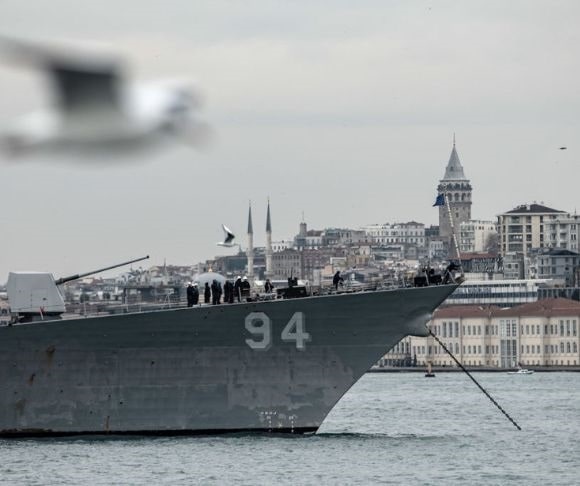It’s time the Defense Department focuses on the US military’s capability to sift information wheat from chaff. Increasingly more troublesome during modern warfare, the truth falls prey to the effective use of disinformation – the propaganda an enemy like Russia or China uses to gain the upper hand in information warfare. The very best defense on a fake information battlefield is, naturally, the truth. To deal effectively with a propaganda barrage on the troops in the field, it’s important to remember the brain is the battlefield.
In a conversation with Defense News and others during US Naval Institute and AFCEA hosed WEST 2023 Conference, principal advisor for cyber issues for the US Navy, Chris Cleary, explained, “There is something to be said about being resilient to information operations. How resilient are we to messaging that we might believe is false? It’s not just sailors, you know. It’s everybody,” Cleary said. “There is something to be said about being resilient to information operations. How resilient are we to messaging that we might believe is false? It’s not just sailors, you know. It’s everybody.” To Cleary’s point, strategic information operations are a hallmark of modern, social media-rich warfighting. It is significant in molding the soldiers’, sailors,’ airmen’s, Marines’, and Guardians’ thinking, attitudes, and behavior. Believing the information being received to be accurate is critical to the outcome of hostilities for those in the fight.
Information Warfare Requires Recognizing Disinformation
Commandant of the Marine Corps General David Berger, in his forward to “Information” the Marine Corps Doctrinal Publication 8, explained: “The purpose of Information is to introduce a conceptual framework for understanding and employing the information warfighting function and to provide Marines with increased flexibility in their operational approaches across all phases of the competition continuum, in all warfighting domains.” Berger has captured the importance of information warfare, but others see it differently. As his advisory title suggests, Cleary speaks from a cybersecurity perspective. All too often, information warfare content and information technology security are conflated. As the US Navy explains in its Department of the Navy Cyberspace Superiority Vision, providing accurate information in battle often means being able to “fight hurt.” That is surviving and continuing to put out and receive factual, meaningful information when cyber capability is degraded.

(Photo by Onur Dogman/SOPA Images/LightRocket via Getty Images)
Cleary and the US Navy are talking about information technology and systems, but the battle for the mind is a far greater challenge. Cyber technology, information technology, and systems are the tools by which the fight for information content dominance is won. The technology and systems are not the information operation any more than a hammer and saw are the building being constructed.
To get more clarity on this point, Liberty Nation spoke with Dr. James P. Farwell, Ph.D., a subject matter expert in information warfare operations and military strategy. Farwell is also the author of a recent book, The Corporate Warrior: Successful Strategies from Military Leaders to Win Your Business Battles. LN posed the question: “Dr. Farwell, first, are you concerned about our armed forces being fooled by enemy disinformation?” He responded: “Yes. Well done, disinformation can be very effective, for or against any formation of troops.”
“When information operations is raised within the cyber security community, is there a danger cyber as a tool will be seen as the solution rather than simply one of many tools to deal with an information warfare issue?” LN then asked. “Cyber is a tool, and it can be a solution to a particular problem. But it is a tool within the overall rubric of warfare and does not itself constitute the whole of information warfare,” Farwell responded.
Ukraine Effectively Using Disinformation

(Photo by Stanton Sharpe/SOPA Images/LightRocket via Getty Images)
Americans see the value of Ukraine’s effective use of information operations in real-time. From the earliest weeks of the Russian unprovoked and barbaric invasion of Ukraine, the Kyiv military’s use of disinformation on the battlefield was as close to game changing as combat gets. The Ukraine military demonstrated the capability to employ information operations defensively and gave the Russians some lessons in using information as an offensive weapon. “Just as surprising as the current state of the ground war is how Ukraine has adeptly defended against Russian information warfare efforts. The current debate is whether Ukraine has gone even further and achieved supremacy in the information domain,” Daniel Johnson wrote in Task & Purpose.
The US armed forces have not experienced dedicated, focused offensive information operations directed against it. Sporadic and nonspecific disinformation campaigns have happened particularly against US institutions and the American public, specifically during the 2016 US presidential election campaign. However, in the future, US ground, air, and sea forces can anticipate intense information operations against the troops. The tools of the battle will be, spreading disinformation, degrading communication, and creating false stories and fake news with doctored videos and false press releases. An effective defense includes the US military being constantly bathed in veracity and timely, accurate information. When sound bites are bullets, US forces must have full magazines of truth.
The views expressed are those of the author and not of any other affiliation.









